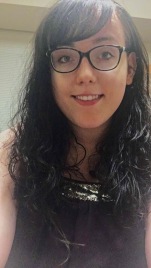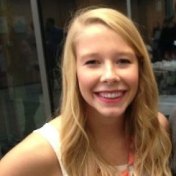Natalia Juscinska is a senior Psychology major who recently completed an Honors thesis with Dr. Arigo. She was interviewed by junior Psychology major Kristen Pasko.

UofSHealthPsych: Tell us about your specific interests in the field of psychology.
NJ: Clinical psychology and health psychology. I’m mostly interested in research so I think I want to do that in the future. Most of my research is on stress and anxiety, how stress relates to physical illness, and what you can do to manage stress. I’m also interested in chronic illness and things you can do to help people manage it, like improving adherence. So, it’s a lot of things we’ve talked about in health psychology. I really like trauma and PTSD as well, so, we’ll see where graduate school takes me.
UofSHealthPsych: Wow, that explains why the Clinical Health Psychology Team is such a good fit for you! What originally made you join the team – how did you find out about it?
NJ: I took research methods my sophomore year, and I knew that I really wanted to get involved in research, but at the time I was more interested in the clinical side of things and no one had a “lab” for a that. Dr. Arigo posted a flyer at the end of that year, recruiting research assistants. I looked up some of her published works and I found them really interesting. I thought that her team would be a good fit for me, because I’m really interested in the overlap between mental and physical illness.
UofSHealthPsych: What are your specific responsibilities in the lab that you have taken on, and could you tell us about your own project?
NJ: The most recent work I’ve done is on my thesis. It’s on perceived stress and social comparison in type 2 diabetes. I’m looking at whether engaging in social comparison has an influence on how stressed patients say they are, before and after comparison.
My first measure is asking them about how much overall stress they felt in the last month. Then, I give them a prompt to read of either upward or downward comparison and then ask them how stressed they feel in the moment. My hypotheses weren’t supported, unfortunately. It was a secondary analysis of Dr. Arigo’s work, so I have to make some adjustments.
Separate from my thesis, I’ve also helped out a lot with the expressive writing coding that we’ve been doing for Sara Chapin’s project. I’ve drafted some IRBs for smaller projects in the past, and I helped out with Project Connect last year. That was one of the first times I got to interact with participants.
UofSHealthPsych: That is all so exciting, especially from being a part of our first Fitbit study at the U, to now recently finishing your thesis! So, now that senior year is coming to an end, what are your plans for further schooling and your career?
NJ: I’m taking a year off to do Jesuit Volunteer Corps (JVC) this year, and then I hope to get my Ph.D after that. So I will definitely be applying to grad school; either clinical or health psychology, and doing more research.
UofSHealthPsych: Could you tell me more about JVC?
NJ: I’ll be doing case management full time in Connecticut for a year as a part of JVC. I’m looking forward to getting clinical exposure in that role.
UofSHealthPscyh: That is wonderful. Congratulations! I have one last question. How has working with the Clinical Health Research Team prepared you for life after Scranton?
NJ: When I was looking for research there was nothing that combined the physical and mental health aspects of psychology that I was interested in. I did not even know that health psychology was a field before Dr. Arigo came to the U. So, I think this really opened up my eyes to what I’m interested in, how to synthesize it, and a field that I really want to pursue in the future.
